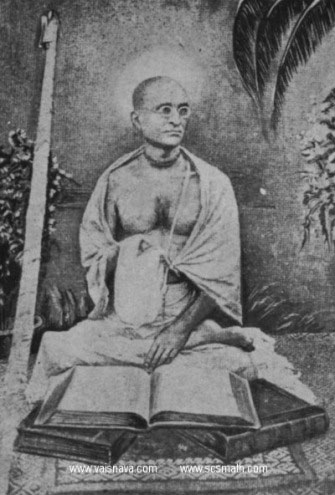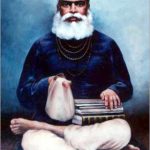by Śrīla Bhaktisiddhānta Sarasvatī Ṭhākura Prabhupāda
(Portrait of Śrīla Bhaktisiddhānta Sarasvatī Ṭhākura Prabhupāda)
In courting the Love of Śrī Kṛṣṇa Caitanya we must not busily equip ourselves with troublesome acquisitions of imperfect manifestations. Rather we must simply undergo an operation to remove our cataract via the beneficial spike of all His good teachings. We need not trouble ourselves with enquiries into the physical in order to enable ourselves to indulge in anthropomorphism (superimposing human characteristics onto God) or to have recourse to apotheosis (raising a human to the status of God). The unconditional surrender to Śrī Kṛṣṇa Caitanya and to His true followers would deliver us from being plunged into the functioning of the handicapped organs of our senses and enable us to scrutinise the aspects of the different subjects of our knowledge.
As true and sincere devotees, our spiritual culture would never allow us to indulge in our mental activities as we do in economics, history, geography, chemistry, physics, iconography, archaeology, chiromancy and palmistry, different branches of the Vedas, altruism, utilitarianism and other allied subjects. If we were to examine Śrī Kṛṣṇa Caitanya using any one or the whole group of the above subjects, all our labour would be fruitless and take us not an inch nearer to the Supreme Lord. It is transcendental rasa which alone will enable our transcendental finite ego to approach the Transcendental Blissful Infinite.
We should be ready to receive transcendental sounds instead of the mundane sounds that are found in the lexicons. Ordinary sound is examined by the other senses also. We reserve the right of examining every mundane sound that enters our ears with the aid of the four other senses. If these other four senses do not admit its validity, it is summarily rejected. These senses are not fit to scrutinize the validity of transcendental sounds. Our previous experience will show which sounds should be examined. If they aim at anything of this world, we should have every opportunity of examining them by our other senses. Our previous experience will decide whether they are to be welcomed.
But when the Transcendental Sound makes His appearance, we must not put ourselves into the challenging mood and suppose that there is any other face. The two classes of sound are quite distinct from one another. Mundane sound is meant for entities that have figure, odour, taste, etc. Heat, for example can be perceived by the sound produced. But it is the seeming feature which need not tally with the actual substratum. So, there is a distinct difference between the two sounds.
All transcendental sounds go to show one object, the Absolute. Wherever there is any deviation that revelation is liable to vanish. Absolute Sound has got His peculiar phase and should be welcomed at all costs. We are vitally interested in that thing. The very description of Transcendental Sound will tell us that the sound is identical with the object, qualities and activities and is entirely distinct from mundane sounds; and that the Transcendental Sound is equipped with all cogent potencies that will regulate all other senses.
Mundane sound is invigorating to the senses and enables us to come in contact with the world. When our attempt is for the Absolute, we run no risk. When we want mundane sound to come to us, we ignore the Absolute; we do not receive the Transcendental Sound. The Transcendental Sound is unequivocally restricted to transcendence. So the Absolute is to be determined when we determine our transcendent self. Any distorted view will not allow us to approach the Absolute.
First of all, we should examine our self. If we think we are mind and the external body, the Transcendental Sound will have no effect on us. It would be a mundane sound. The transcendental sound Himself would tell us that the external body is a garment of the inner astral body and both of them are the two wrappers of the soul. He would tell us that the soul, in his dormant condition, incorporates these two wrappers, but they do not determine his own real nature. The external body is perishable; the internal body is transformable. Our mind in the morning is different from our mind at noon and so on. It is changed with the rolling of time.











